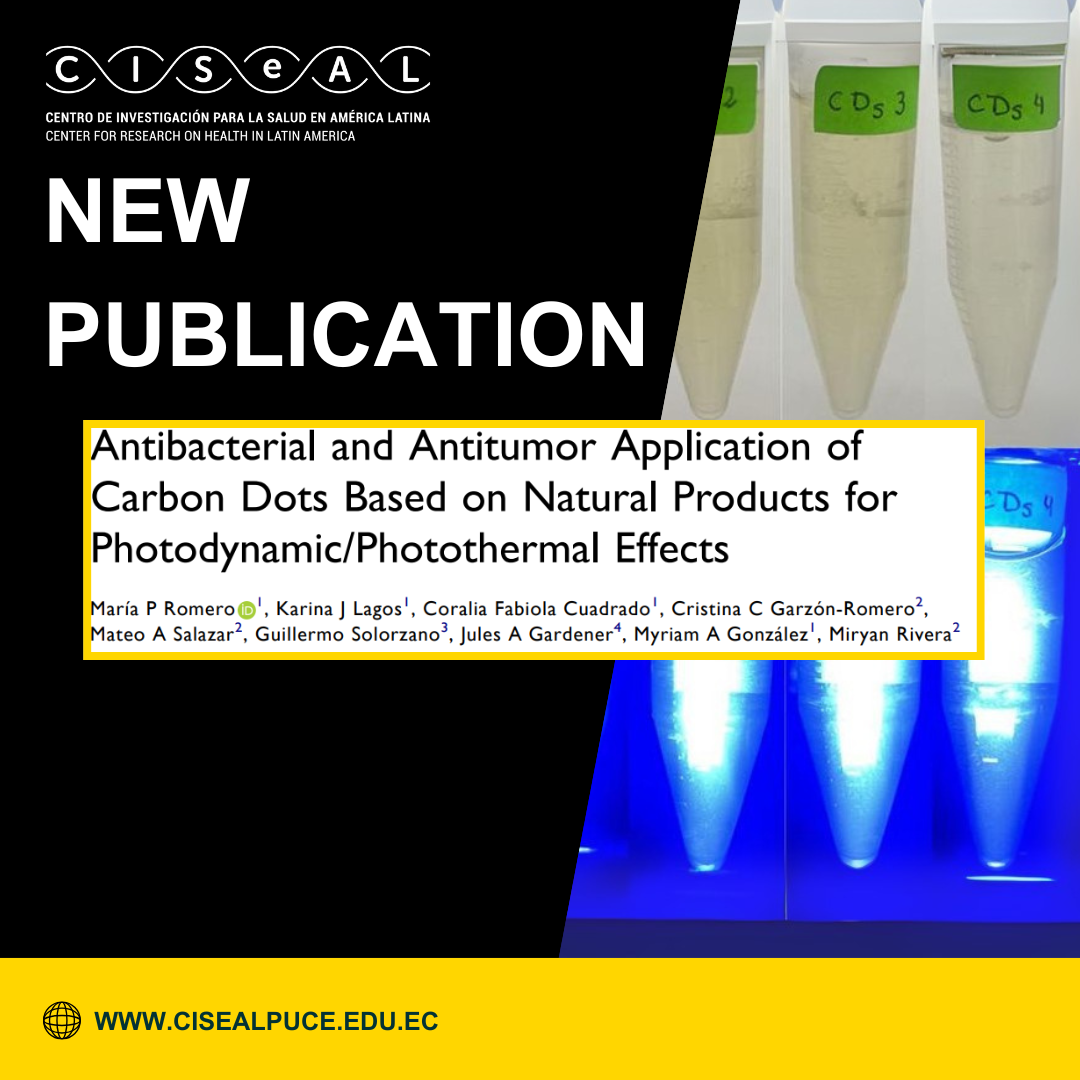
The article, in which Miryan Rivera, a CISeAL researcher, participates together with her laboratory technician Mateo Salazar, presents a green and efficient synthesis strategy for obtaining carbon dots (CDs) from natural products such as annatto (Bixa orellana), cinnamon (Cinnamomum verum), and turmeric (Curcuma longa), using a microwave-assisted technique that stands out for its speed, simplicity, and environmental compatibility. Four types of CDs (CDs1, CDs2, CDs3, and CDs4) were generated from aqueous dispersions of these extracts and sucrose, and were characterized by transmission electron microscopy (TEM), dynamic light scattering (DLS), Fourier transform infrared spectroscopy (FTIR), and Raman spectroscopy. The obtained CDs presented irregular shapes and sizes ranging from 2.3 to 3.7 nanometers, exhibiting luminescent and photoactivated properties with the ability to generate singlet reactive oxygen species (¹O₂) and produce temperature increases between 40 and 50 °C upon irradiation with blue light (450 nm, 40 mW·cm⁻²).
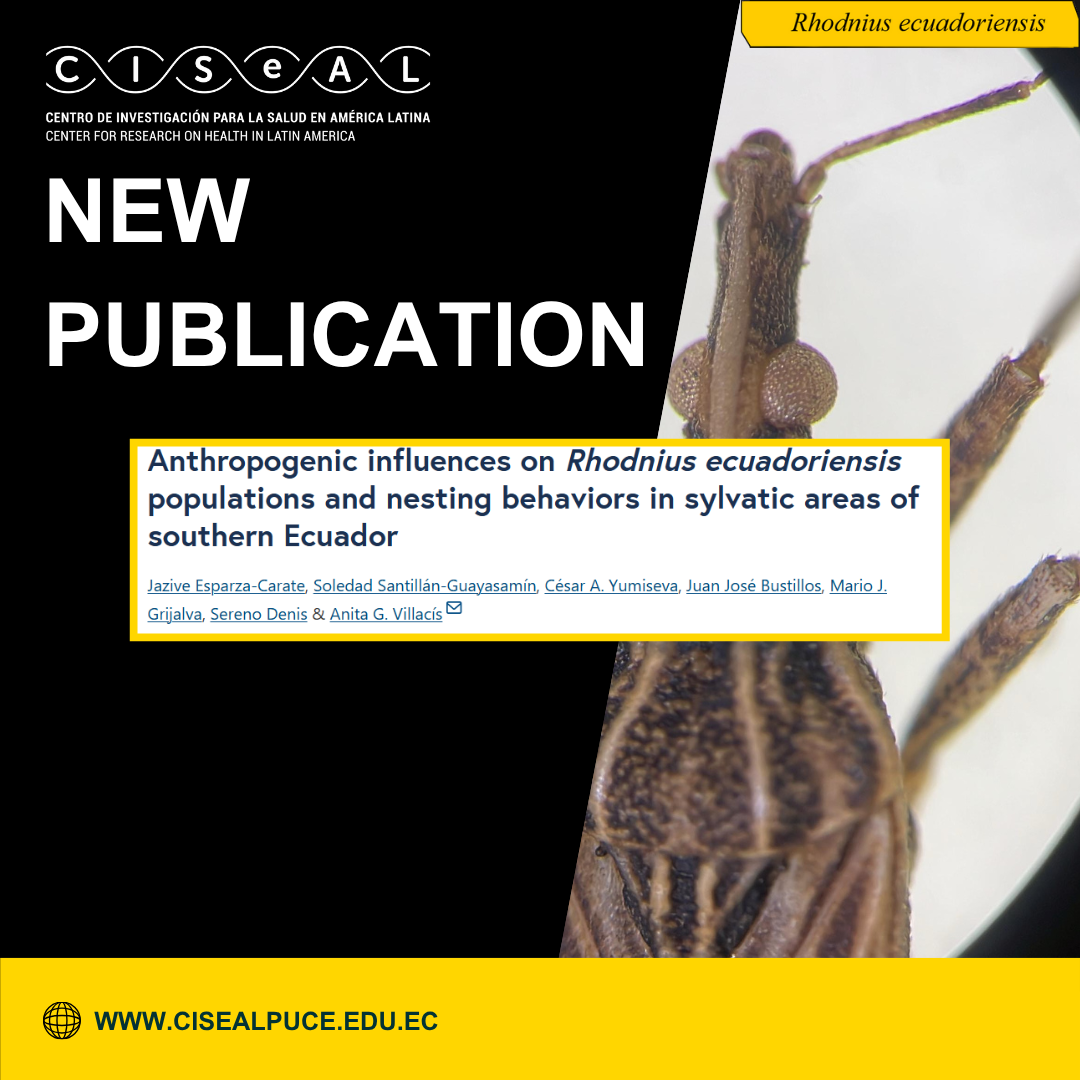 In her most recent publication, Dr. Anita G. Villacís, Principal Investigator at CISeAL, examines how environmental contamination influences the ecology of the vector Rhodnius ecuadoriensis in wild areas of southern Ecuador. Traditionally associated with wild environments, this insect has begun to adapt to human-influenced habitats, which represents a growing challenge for the control of Chagas disease.
In her most recent publication, Dr. Anita G. Villacís, Principal Investigator at CISeAL, examines how environmental contamination influences the ecology of the vector Rhodnius ecuadoriensis in wild areas of southern Ecuador. Traditionally associated with wild environments, this insect has begun to adapt to human-influenced habitats, which represents a growing challenge for the control of Chagas disease.
This research had the outstanding participation of Jazive Esparza, under the direction of Dr. Anita G. Villacís, in collaboration with experts such as Soledad Santillán-Guayasamín, César A. Yumiseva, Juan José Bustillos, Mario J. Grijalva, and Sereno Denis.
The study analyzed 389 nests collected in eight communities in the province of Loja during 2018, 2022, and 2023, differentiating between peridomestic and wild nests. The findings reveal a drastic reduction in the infestation rate in areas close to dwellings (from 33.3% in 2018 to 0% in 2022), while wild areas maintained fluctuating levels. A significant association was identified between triatomine infestation and mammal nests, many of which contained anthropogenic materials—especially near roads and other human-intervened areas.
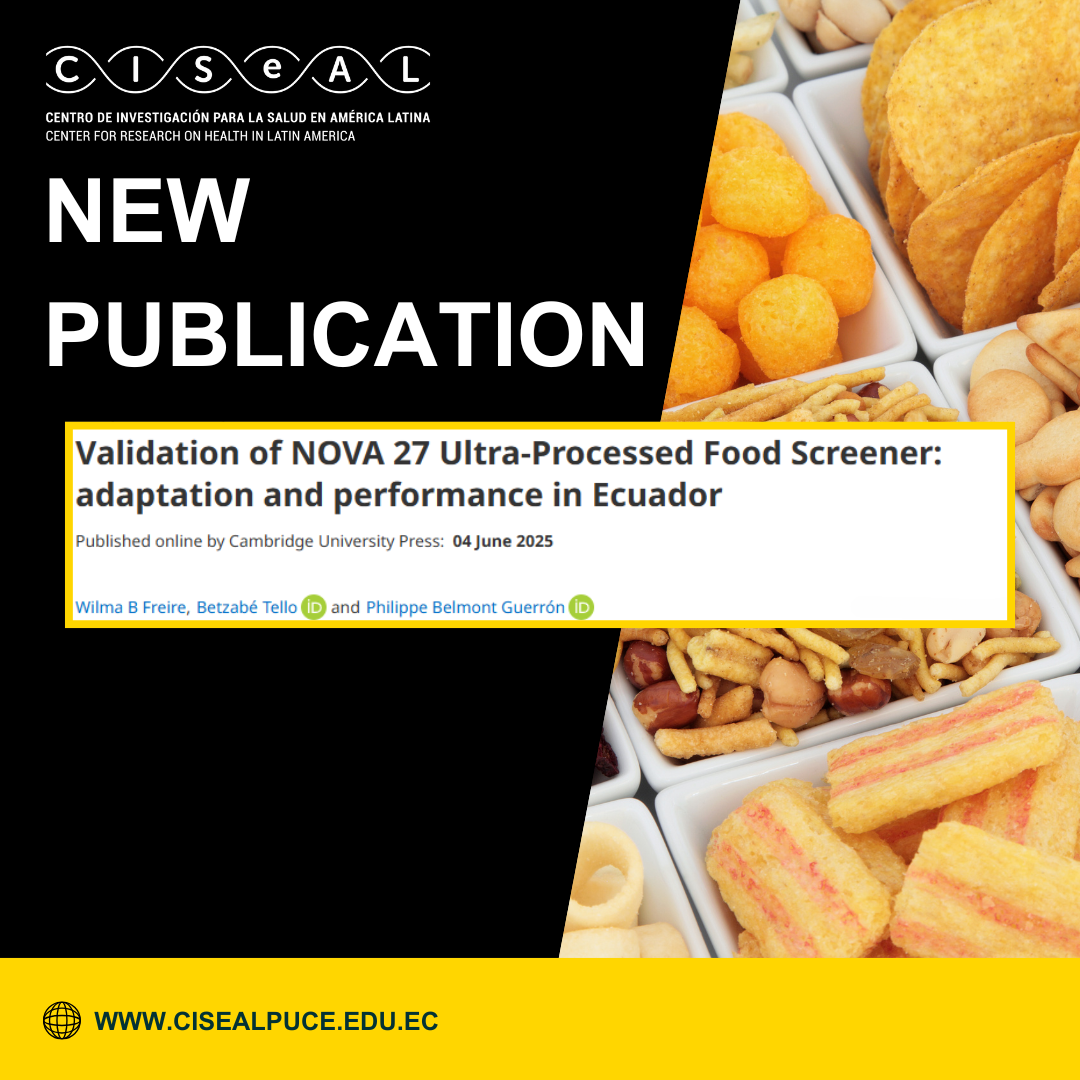
Dr. Betzabé Tello, principal researcher at CISeAL-PUCE, was part of the academic team that recently published a study that validated in Ecuador the use of the NOVA 27 Ultra-Processed Food Screener, a tool developed internationally and adapted to the Ecuadorian context. This questionnaire allows for a quick and reliable estimation of the consumption of ultra-processed products in adults.
The study was led by Dr. Wilma Freire of the Universidad San Francisco de Quito and included the participation of Dr. Philippe Belmont, adjunct researcher at CISeAL, who was in charge of the statistical validation of the instrument.
The results are framed in a context of food transition, where ultra-processed products such as soft drinks, snacks, industrial bread, sausages, and ready-to-eat meals are displacing fresh foods and traditional preparations. This increasing exposure to ultra-processed foods deteriorates the quality of the diet and affects health from an early age.
The study was developed in two phases: first, an online validation with 327 adults in Quito, and then a comparative analysis with data from the National Health and Nutrition Survey (ENSANUT-Ecu 2012), which included 3,510 adults.
One of the key findings was that the 27 food groups included in the questionnaire account for 90% of the calories coming from ultra-processed products, which confirms that the instrument efficiently captures the habitual consumption of this type of product. In other words, although there are many types of ultra-processed products on the market, the 27 subgroups selected for the screener concentrate almost all the caloric energy that comes from this type of product in the diet of Ecuadorian adults.
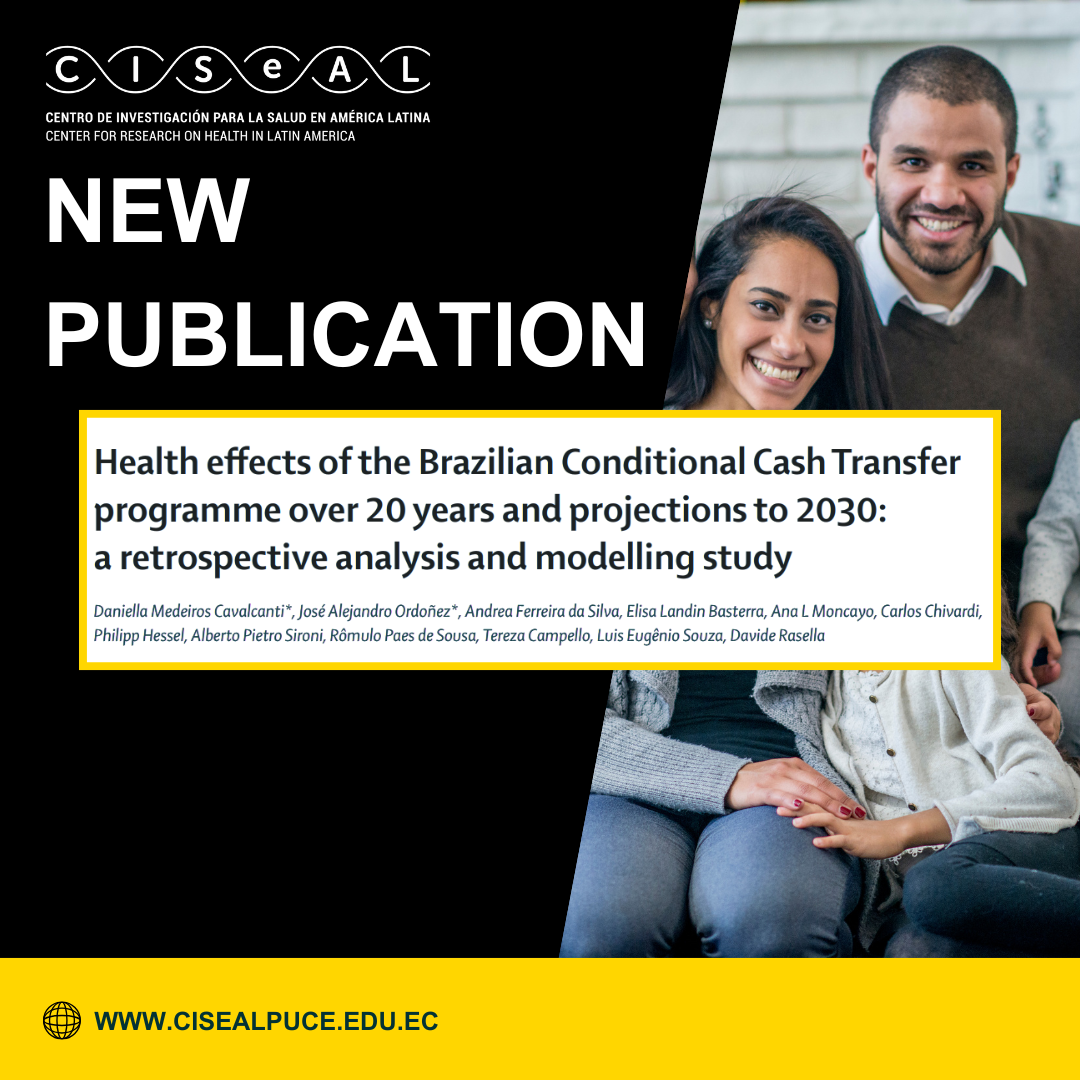 Published in The Lancet Global Health, one of the highest-impact scientific journals in the field of public health, this international study, with the participation of Dr. Ana Lucia Moncayo, principal investigator at CISeAL, analyzes the effects of the Bolsa Família Program (BFP) in Brazil on mortality and hospitalization over two decades, with projections up to 2030. The BFP, one of the largest and longest-running conditional cash transfer (CCT) programs in the world, has benefited more than 50 million people through monthly transfers subject to the fulfillment of key health and education indicators.
Published in The Lancet Global Health, one of the highest-impact scientific journals in the field of public health, this international study, with the participation of Dr. Ana Lucia Moncayo, principal investigator at CISeAL, analyzes the effects of the Bolsa Família Program (BFP) in Brazil on mortality and hospitalization over two decades, with projections up to 2030. The BFP, one of the largest and longest-running conditional cash transfer (CCT) programs in the world, has benefited more than 50 million people through monthly transfers subject to the fulfillment of key health and education indicators.
Using multivariate Poisson models with fixed effects, applied to data from 3,671 Brazilian municipalities between 2000 and 2019, the study identified that high program coverage was associated with a significant reduction in the age-standardized mortality rate (RR 0.824), while high benefit adequacy also contributed to a relevant decrease (RR 0.849). It is estimated that the BFP prevented more than 8.2 million hospitalizations and over 713,000 deaths during that period, with particularly marked effects on the reduction of infant mortality and hospitalizations of people over 70 years of age.
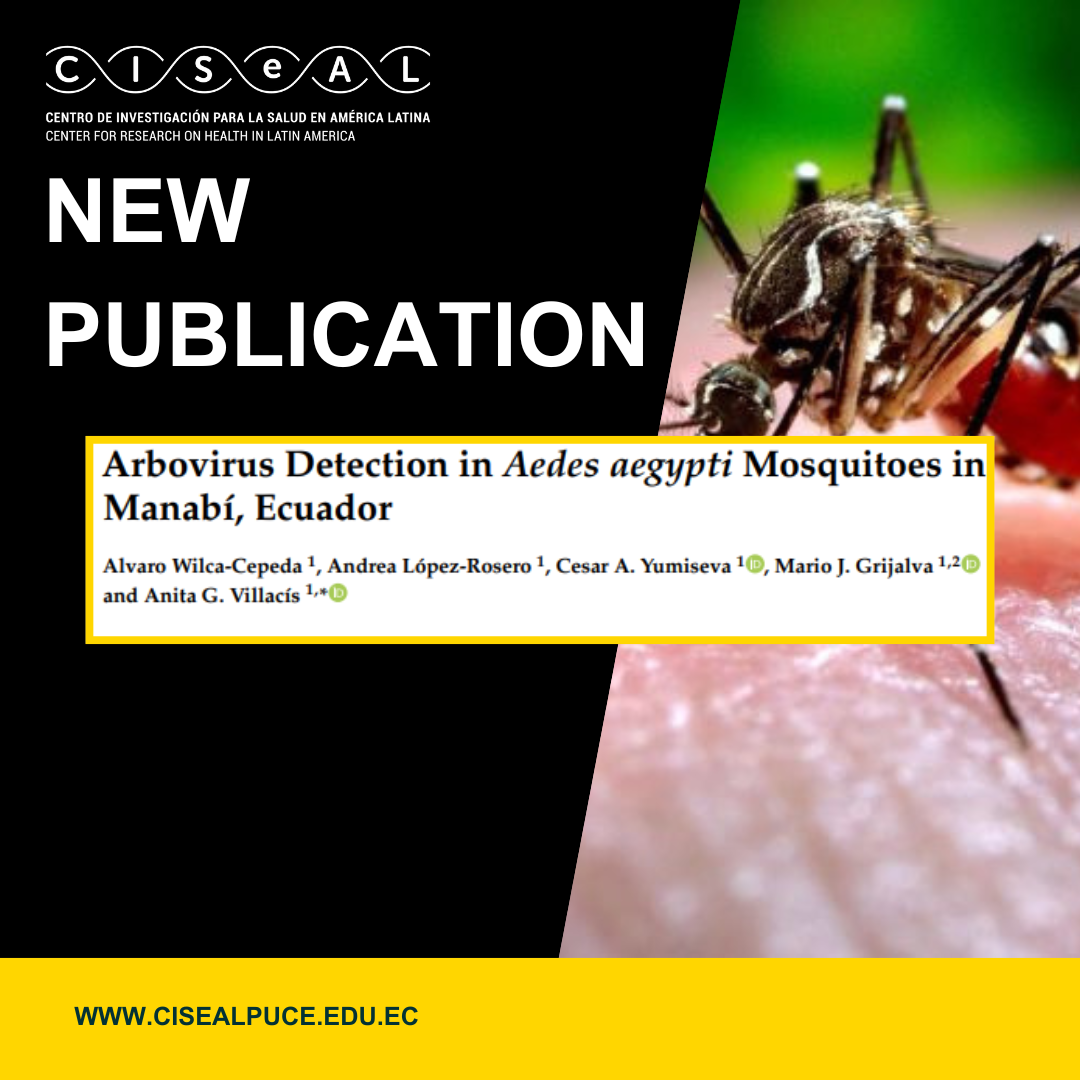 The article “Arbovirus Detection in Aedes aegypti Mosquitoes in Manabí, Ecuador” presents an investigation carried out in two communities in the province of Manabí—Caja Fuego (rural) and San Gregorio (marginal urban)—with the objective of detecting the presence of arboviruses in local populations of Aedes aegypti mosquitoes, a vector known for its role in the transmission of diseases such as dengue, Zika, and chikungunya. A total of 468 mosquitoes were collected, grouped into 72 pools, and transported under strict biosafety protocols to the laboratories of the Center for Health Research in Latin America (CISeAL), where they were processed using molecular techniques such as PCR, RT-PCR, and Sanger sequencing. This research featured the outstanding participation of Álvaro Wilca, under the direction of Dr. Anita G. Villacís, in collaboration with experts such as Dr. Mario L. Grijalva, Andréa López-Rosero, and Dr. Cesar A. Yumiseva, all of whom have significantly contributed to the study of vector-borne diseases in Ecuador.
The article “Arbovirus Detection in Aedes aegypti Mosquitoes in Manabí, Ecuador” presents an investigation carried out in two communities in the province of Manabí—Caja Fuego (rural) and San Gregorio (marginal urban)—with the objective of detecting the presence of arboviruses in local populations of Aedes aegypti mosquitoes, a vector known for its role in the transmission of diseases such as dengue, Zika, and chikungunya. A total of 468 mosquitoes were collected, grouped into 72 pools, and transported under strict biosafety protocols to the laboratories of the Center for Health Research in Latin America (CISeAL), where they were processed using molecular techniques such as PCR, RT-PCR, and Sanger sequencing. This research featured the outstanding participation of Álvaro Wilca, under the direction of Dr. Anita G. Villacís, in collaboration with experts such as Dr. Mario L. Grijalva, Andréa López-Rosero, and Dr. Cesar A. Yumiseva, all of whom have significantly contributed to the study of vector-borne diseases in Ecuador.
The results revealed the circulation of viruses belonging to the Flaviviridae and Togaviridae families, with a particularly notable finding: 18 of the 22 Flavivirus-positive pools showed the presence of dengue and Zika—the latter confirmed by sequencing in two samples—despite the fact that no official human cases of Zika had been reported in 2023. This suggests silent circulation of the virus and a potential risk of undetected outbreaks in the population, particularly in areas with poor infrastructure and limited access to health services. The study is especially relevant in the post-pandemic context of SARS-CoV-2, during which vector-borne diseases were partially sidelined from the public health agenda.
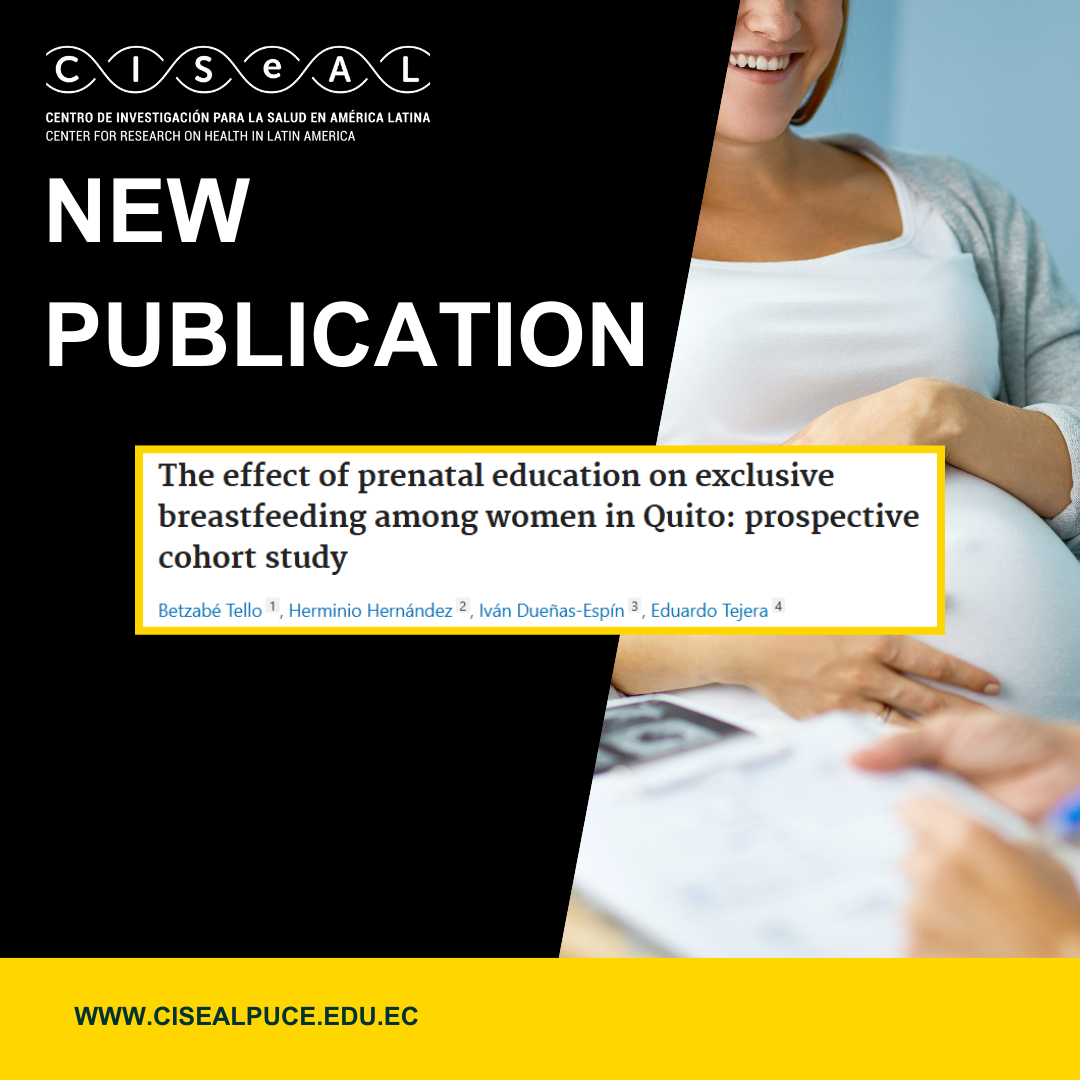
The study led by Dr. Betzabé Tello, principal investigator of CISeAL, evaluated the effect of prenatal education (PE) on the duration of exclusive breastfeeding (EBF) among women who gave birth in hospitals in Quito. A prospective cohort study of 278 mothers, of whom 152 received PE and 126 did not, was followed from birth to six months postpartum. The results showed that mothers who participated in PE programs maintained EML for longer compared to those who did not (mean 89.4 days vs. 66.1 days) and had a lower rate of EML abandonment. In addition, this study identified factors that negatively influence continuity of EML, such as delivery in public hospitals, postpartum depression, perception of low milk production, return to work, recommendations from health professionals, family counseling, and negative breastfeeding experiences.
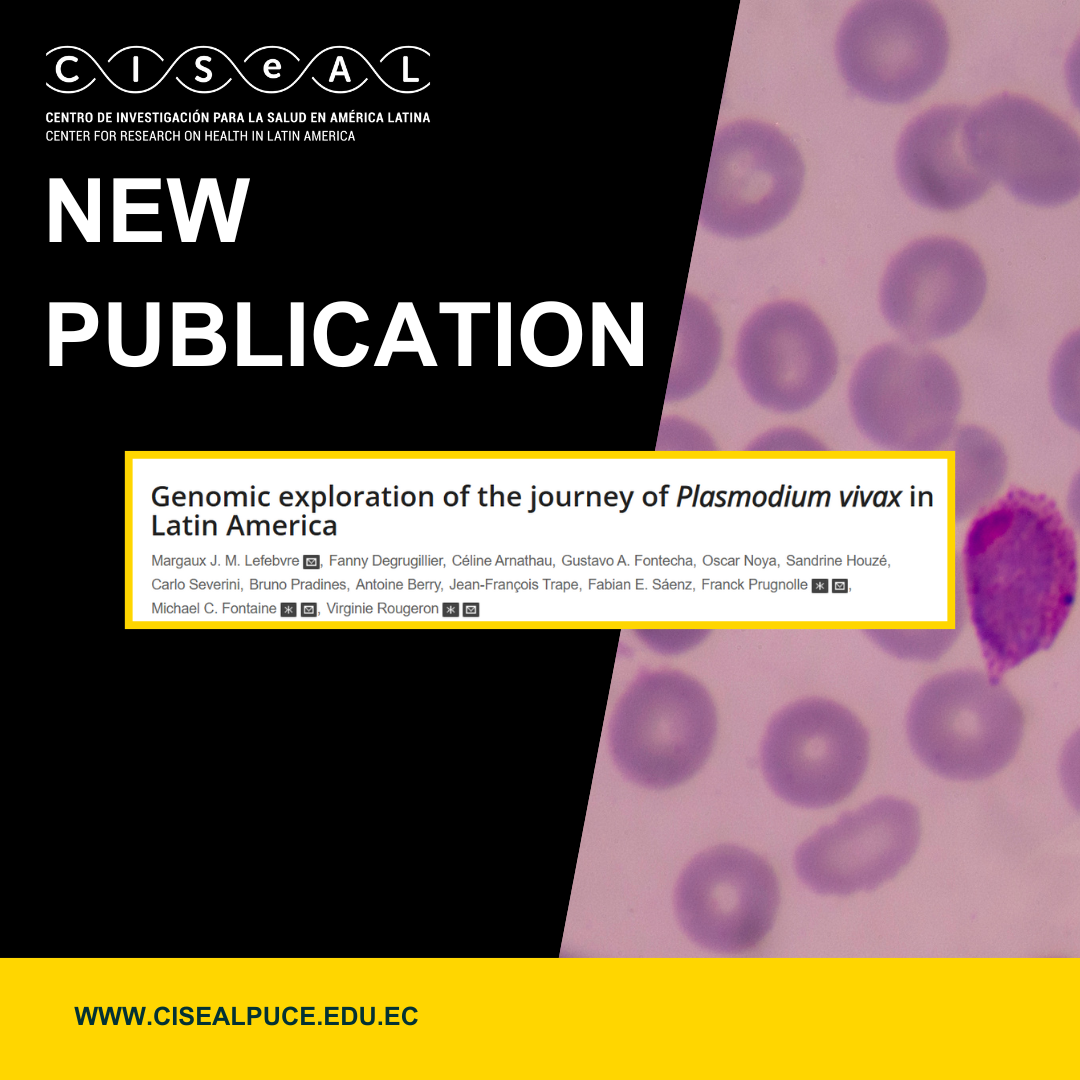
A new international study has successfully reconstructed the evolutionary history of Plasmodium vivax—the parasite responsible for the majority of malaria cases in Latin America—with high precision. Using state-of-the-art population genomics techniques, researchers analyzed 620 P. vivax genomes, including 107 new samples from West Africa, the Middle East, and Latin America. The research was coordinated by the French National Research Institute for Sustainable Development (IRD) and brought together institutions from Europe, Latin America, and Africa. CISeAL actively contributed to the study, with our principal investigator, Dr. Fabián Sáenz, participating as part of the scientific team.
The results reveal a much more complex evolutionary history than previously believed. The study found that most current P. vivax populations in Latin America derive from a now-extinct European lineage, with possible additional contributions from yet-unsampled populations, likely originating in West Africa. Furthermore, multiple waves of parasite introduction to the continent were identified: an initial one during early European contact, followed by more recent waves linked to 19th-century human migrations.



